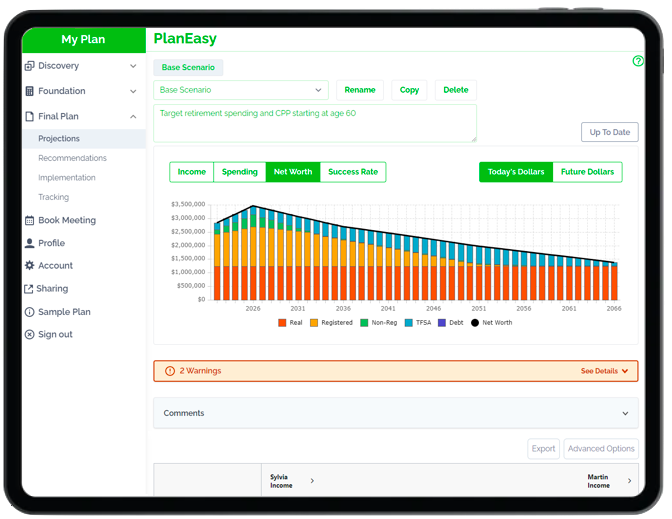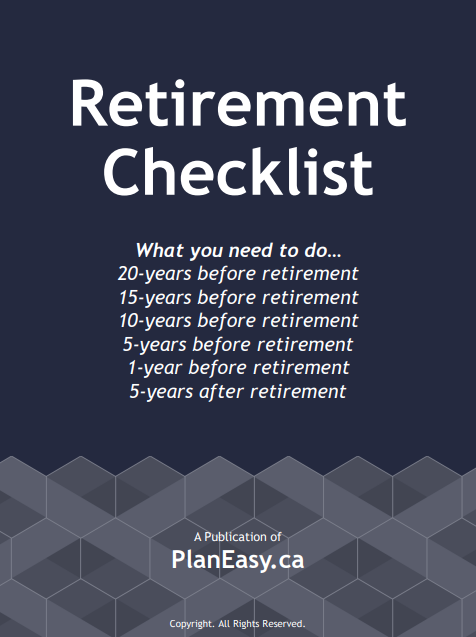9 Important Considerations When Selling Your Home In Retirement
The largest financial transaction you will ever make is selling your home in retirement. Selling your home in retirement comes with a number of important considerations.
In this blog post we’re going to touch on 9 important things to consider when selling your home in retirement.
Selling a home in retirement can be a core part of many retirement plans. A sale usually takes one of three forms…
- Sell and rent
- Sell and downsize
- Sell when entering long-term care
Often the plan is to hold the home throughout retirement, but it can still be used as a “fall back” asset if necessary. Even if there was never a plan to sell the home, it can still be used to help fund long-term care costs in late retirement.
Each situation above has its unique circumstances but, in all cases, there is a major transaction taking place. So, before you put up the ‘for sale’ sign in retirement there are a few important considerations to highlight.
Large Amount Of Cash To Invest
One of the most daunting parts of selling a home in retirement is not the sale itself, it’s what to do with the cash after the sale closes.
With property prices at record highs the sale of a principal residence can easily net $500,000 to $1,000,000+ depending on what market you’re in.
Many people have never invested such a large sum, let alone be expected to invest it all at once. This sometimes leads to cash sitting around for months or even years. But the proceeds of the home sale need to be invested to help pay for future rental costs or long-term care costs in retirement.
The proceeds of the home sale could easily double or triple the size of an existing portfolio. It’s important to get expert advice to create a clear plan for the proceeds of the home sale. There is no sense making a mistake with $500,000 to $1,000,000+ due to a lack of advice.
Transaction Costs Are High
It’s also important to consider transaction fees when buying and selling real estate. It may have been a long time since you bought or sold a home, but the fees can add up quickly. Realtor fees, staging fees, lawyer fees etc., can easily add up to 4% to 6% of the sale value.
If a downsize to a smaller home happens after the initial sale, then there are also additional fees on the purchase transaction for land transfer tax, lawyer fees, moving etc.
It’s not unreasonable for 4% to 10% of the sale value to be lost to fees, so make sure that the sale/downsizing plan takes that into account.
More Investment Fees
Depending on the investment option you’re using the annual investment fees on an additional $500,000 to $1,000,000 could be anywhere from $1,250 (0.25%) to $25,000 (2.5%) per year.
If you’re currently using an investment option that has annual fees of 2.0% or more then this is a good time to reevaluate investment options or at least negotiate a lower rate (or if you don’t know exactly what investment fees you are paying now, then it’s even more important to reevaluate your portfolio before the sale).
When a home is sold and the proceeds are invested, the size of the portfolio can easily double or triple. This could mean that new investment options become available like a low-cost portfolio manager, or it could mean that investment fees can be negotiated/reduced with your existing investment manager.
Investment fees often scale with portfolio size. Larger portfolios will pay less for each incremental dollar invested. For example, managing a $1,000,000 is not 2x as costly as managing $500,000. If you’re adding $100,000’s to your portfolio, then your investment fees as a percentage of your portfolio should be coming down otherwise you’ll be losing $10,000’s per year to high investment fees.
Larger Portfolio Fluctuations
With a much larger investment portfolio the day-to-day fluctuations will also increase in size. These fluctuations are ok when you slowly building up a large portfolio over time because you get used to seeing your portfolio go up and down.
But when the portfolio size doubles or triples after a home sale the fluctuations can be nauseating.
Watching a large portfolio of $1,000,000+ go up and down by $10,000’s or $100,000’s can make even the most seasoned investor a bit queasy.
With a $1,000,000 portfolio this is the normal though. In fact, depending on the asset allocation, a temporary decline of $200,000 to $400,000 isn’t unreasonable to expect with a $1,000,000 portfolio.
If you invest the proceeds of a home sale in retirement, it’s important to prepare mentally for the ups and downs you’ll experience in the future. It’s also important to stress test your retirement plan with the new portfolio and new expenses to ensure your new plan will not run out of money during periods of poor investment returns.
Great Time To Consider An Annuity
If you’re planning to sell your home in your 70’s and move into a rental apartment, then it’s an interesting time to consider an annuity. Annuities get a bad rap because they’re generally oversold but in situations like this, they can be a great tool.
An annuity is an insurance product. You purchase an annuity for a specific amount and the insurance company guarantees a monthly payout for life. The amount you receive each month is based on how much you purchase, your age at the time, and interest rates.
Annuity payouts are typically higher if you purchase an annuity in your 70’s, so if you sell a home and transition to renting in your early, mid, or late 70’s then an annuity should be considered.
As an example, imagine you and your partner sold a home at age 75 for $1,000,000 after fees and now you’re renting for $2,400/month…
At current rates, a joint life annuity at age 75 might pay $600/month per $100,000 annuity purchase. A $400,000 annuity would provide $2,400/month for life (no guarantee, no inflation adjustment, and payout rates will vary with current interest rates). A single life annuity for an individual instead of a couple will pay even more.
This means “core” rental costs are covered for life and the remaining $600,000 can be used to cover any inflation increases or provide extra income for discretionary spending. This type of certainty can be very appealing.
It may not be appropriate in every retirement plan, but if you’re selling your home in your mid to late 70’s you should consider the role annuities can play.
Blog post continues below...
Advice-Only Retirement Planning
Are you on the right track for retirement? Do you have a detailed decumulation plan in place? Do you know where you will draw from in retirement? Use the Adviice platform to generate your own AI driven retirement decumulation plan. Plan your final years of accumulation and decumulation. Reduce tax liability. Estimate "safe" vs "max" retirement spending. Calculate CPP, OAS, GIS, CCB etc. And much more!
Start your retirement plan for just $9 for 30-days!
You deserve financial peace of mind as you enter retirement. Start planning now!

More Inflation Rate Risk
One of the key benefits of owning a home in retirement is that a large percentage of expenses are locked in when the home was purchased. After the home is sold, and rental expenses begin, retirees are now more susceptible to high inflation rates.
Periods of above average inflation can cause rental costs to soar. This can put a lot of pressure on a fixed retirement income.
Downsizing and purchasing a smaller home can reduce the impact of inflation because a portion of home expenses are locked in again.
Similarly, choosing a rental unit that has rent control can also reduce the risk that above average rent increases will squeeze your future retirement budget.
More Tax On Investment Income
The other key consideration when selling a home in retirement is that after the proceeds of the home sale are invested, a larger investment portfolio also means more investment income and more income tax.
That extra investment income can push a retiree into higher marginal tax rates in retirement and possibly even OAS clawbacks.
It’s not unreasonable to see this extra income be taxed at rates of 30%+. So, although the portfolio is producing more income, it’s also being taxed at a higher rate.
This is an important consideration because the portfolio needs to cover the after-tax cost of rent going forward. This means the portfolio must produce enough income to cover the extra income tax and rent each year.
Depending on the specifics it could be that net worth declines more in a scenario where the home is sold.
More Government Benefit Clawbacks
Along with higher income tax there is also higher government benefits clawbacks to consider. This is very important for the 1 in 3 seniors who receive the Guaranteed Income Supplement in retirement.
GIS benefits are based on household taxable income and a large retirement portfolio will make it very difficult to qualify for GIS.
When the home is sold, and the proceeds invested, that portfolio will produce income that causes GIS clawbacks. These clawbacks are between 50% and 75% so for the 1 in 3 seniors who receive these benefits it is more important than tax.
So not only has income tax increased but government benefits like GIS have decreased. The combination could actually lead to a worse outcome than if the individual or couple had just continued to own the home.
Less Housing Stability
Owning a home provides an incredible amount of housing stability. When shifting from owning to renting in retirement it’s important to choose a rental unit carefully.
Depending on your location there are certain tenant protections that should be considered.
A client we recently worked with sold their home and started renting. They specifically chose a rental unit in a purpose-built rental building versus a lower priced condo unit in a similar building offered by an individual landlord. The tenant protection and rent increase protection was an important consideration for this client.
Depending on where you live it may be important to review tenant protections before choosing a rental unit in retirement.
Important Considerations Before Selling Your Home In Retirement
Selling your home in retirement is arguably the largest financial transaction you’ll ever make, and it deserves a proportional amount of attention.
There are a number of important considerations before selling your home in retirement and in this blog post we’ve covered 9 important ones. These will vary from person to person but in every case the impact can be substantial.
Before selling your home in retirement make sure you have a specific plan in place that considers all the factors before and after the sale. Depending on your situation there may be important options to consider to help improve your retirement plan.
Join over 250,000 people reading PlanEasy.ca each year. New blog posts weekly!
Tax planning, benefit optimization, budgeting, family planning, retirement planning and more...
Join over 250,000 people reading PlanEasy.ca each year. New blog posts weekly!
Tax planning, benefit optimization, budgeting, family planning, retirement planning and more...








0 Comments